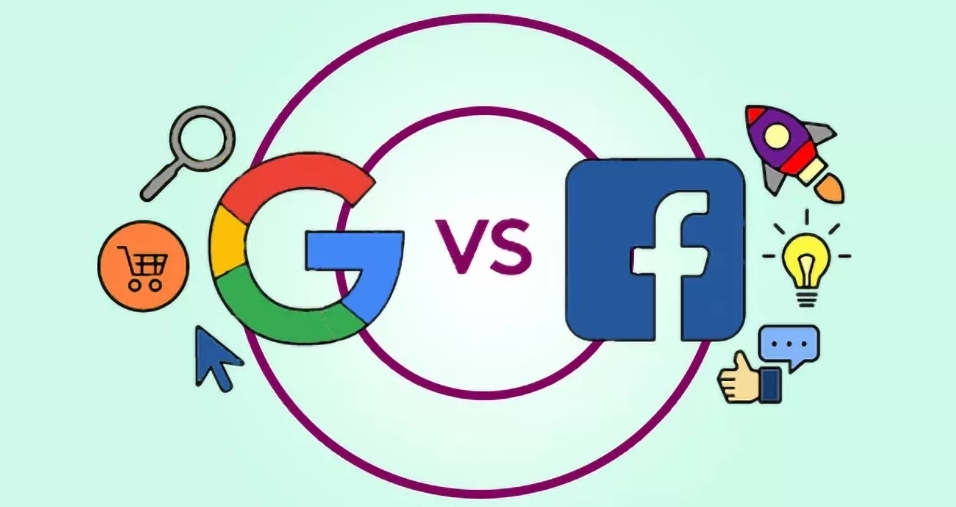Let me first explain my background. Due to the track and industry I chose, to be precise, I am not good at the Google advertising platform. I used Google ads more intensively about 6 years ago. At that time, Google’s policies were relatively loose, and it was easy to make accounts and pile up campaigns, and the traffic was very easy to get. However, due to Google’s powerful algorithm, this “loophole” was quickly plugged, and I later turned to Meta advertising with more stable output.
Many people often ask: When it comes to paid advertising, is Meta or Google more effective?

Some say that, overall, Google Ads works via search, so the traffic comes with user intent. It is highly purposeful, accurate, and has relatively low conversion costs. This is the general trend of Google Ads in most industries.
Others argue that Meta Ads (Facebook and Instagram) have broader display and coverage capabilities. With pixel integration and plug-ins, it’s possible to accurately track various events and intelligently target audiences. For teams with strong content marketing abilities, Meta can yield excellent results through effective strategies and creative materials.
In my opinion, there is no absolute better platform. Google represents intent-based commerce—where users actively look for products. Meta, on the other hand, is interest-based commerce—where products are shown to users. Different industries have different leanings; there’s no one-size-fits-all.
In the digital commerce industry, I know many media buying teams. Their companies aren’t tied to a single category. Depending on the category, they select different ad platforms. For example, teams with Amazon backgrounds, who focus on supply chain and competitive pricing, often prefer search-based marketing. On the other hand, teams skilled at building direct-to-consumer sites prefer interest traffic strategies and rely on engaging creatives.
So ultimately, conversion depends on your product type and marketing strategy—not the platform. Traffic channels are just the surface. Real conversion hinges on product selection and landing page performance.
For boutique-inspired product sites, over 80% of performance comes from Meta’s traffic system. The reason lies in the product attributes. It’s difficult to run brand-related keyword ads on Google due to strict policy and algorithmic filtering. In other words, ads can’t target sensitive terms directly. Therefore, leveraging strong visual content and storytelling is a great strategy.

Although Google has display, discovery, and YouTube video ads that cover the full funnel—from awareness to conversion—compared to Meta’s algorithm, which evolved from its social network DNA, it’s still less competitive in interest-based marketing. Meta clearly has the upper hand in this field.
Meta ads are highly effective in converting the 80% of consumers who don’t actively search. In today’s e-commerce market, a large portion of buyers are impulse-driven. Only about 20% of users actively search out of urgent need, while the remaining 80% are passively influenced—either by recommendations or appealing offers. If we can accurately reach and convert this audience segment, there is a huge growth opportunity.
Google ads serve the “active 20%“, while Meta ads unlock the potential of the remaining 80%. This is why Meta often delivers strong performance for visually-driven product campaigns.
So how do you run Meta Ads effectively?
First, understand that Meta advertising isn’t about fulfilling search intent—it’s about discovering interest. The algorithm relies on behavior and engagement patterns to deliver ads to the most likely audience.
Here are three key elements to optimize:
Interest Keywords:
Feeding the right interest categories into Meta’s algorithm helps it learn. For example, when launching a product that resembles a popular watch model, you might associate it with the broader “luxury timepiece” or “designer fashion” category—without naming brands directly.
But don’t overly rely on interests—they’re just one signal. What really matters is the following:
- Clean Tracking Setup:
Even after Apple’s iOS14 update reduced third-party tracking accuracy, it’s essential to update your strategy. If you’re still using outdated methods from years ago, you’ll fall behind.
Instead, use Meta’s full event tracking suite—Conversion API, pixel integrations, and advanced event matching—to track user behavior across the funnel (search, add to cart, checkout, etc.). Ensure your front-end code is compliant and supports event optimization. Many lightweight frameworks can’t capture key user events.
- Strong Creative Assets:
Meta is a content-first platform. Unlike Google, where ad copy can remain stable for a long time, Meta content decays quickly. Ad fatigue sets in fast. That’s why Meta recommends refreshing creatives weekly.
This is especially important in competitive product categories. Your success depends on your ability to test angles, iterate creatives, and maintain performance.
In summary, for niche product sites that rely on visual storytelling and emotional triggers, Meta’s ecosystem remains the top choice for paid acquisition—particularly in categories where brand-related search traffic is restricted or limited.






